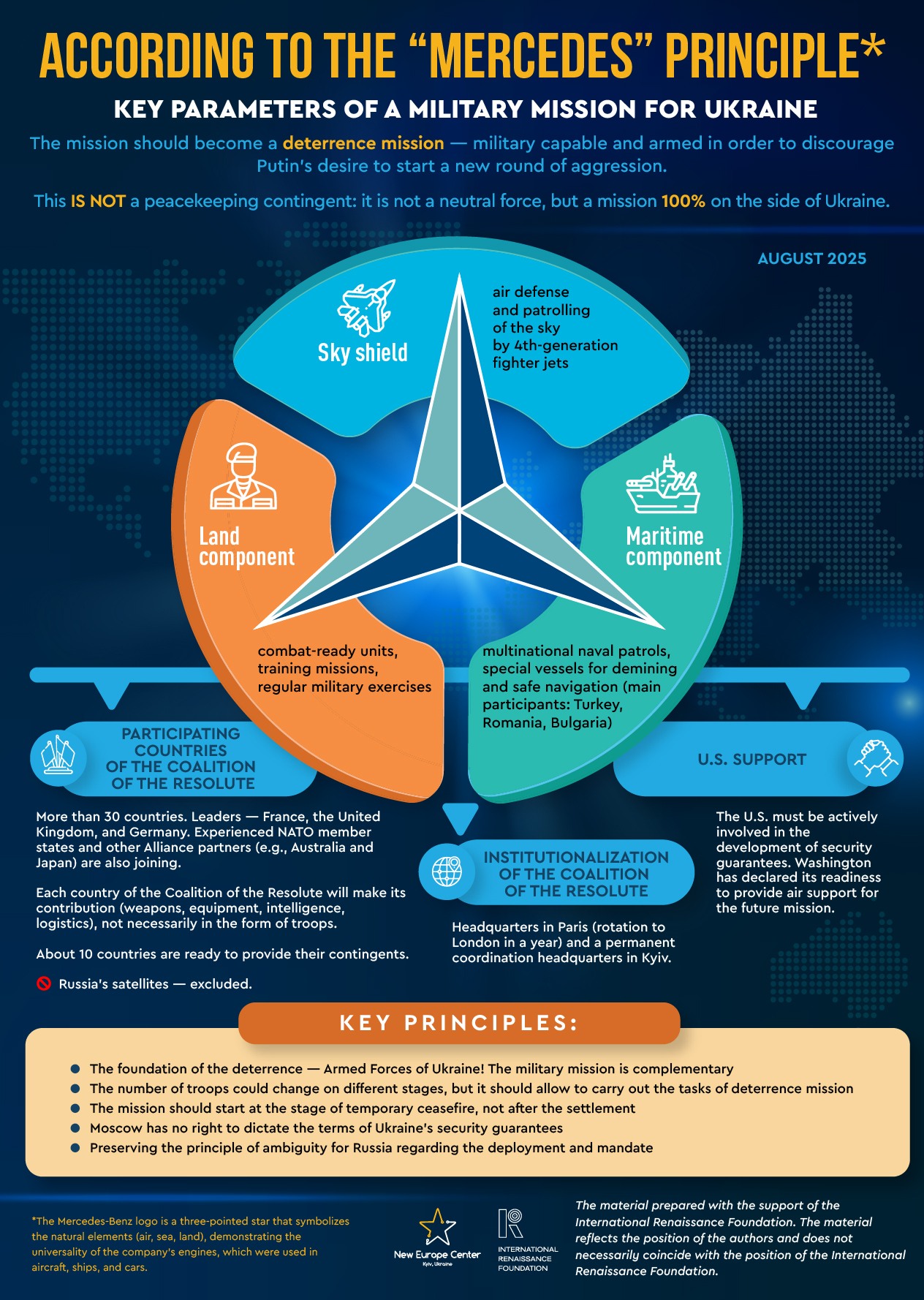Security Guarantees According to the “Mercedes” Principle. New Trends
Ukraine, together with its partners, is discussing future security guarantees in an accelerated mode. The Ukrainian vision of security guarantees is based on three principles — they must be concrete, legally binding, and effective.
For a long time, the New Europe Center has devoted attention to the question of security guarantees. One of the main elements of such guarantees is the deployment of a military contingent to Ukraine according to the “Mercedes” principle.
In April this year, our team developed an analytical infographic that outlined the key parameters of a future military mission. We have decided to update this document and remind everyone which approaches are decisive for the highest effectiveness of the initiative.
- The mission must become precisely a deterrence mission – military capable and armed, to discourage Putin of the desire to start a new round of aggression. This is NOT a peacekeeping contingent: it is not a neutral force, but a mission that is 100% on the side of Ukraine.
- The mission should be built according to the “Mercedes” principle – present on land, at sea, and in the air. Let us recall: the Mercedes-Benz logo is a three-pointed star symbolizing the natural elements – air, sea, and land.
- Three-dimensionality of the mission:
- Land component: combat-ready units, training missions, regular exercises
- Air shield: air defense and patrolling of the sky by 4th-generation fighter jets
- Naval component: multinational naval patrols, special vessels for demining and ensuring safe navigation
Key principles:
- The foundation of the deterrence – Armed Forces of Ukraine! The military mission is complementary
- The number of troops could change on different stages, but it should allow to carry out the tasks of deterrence mission
- The mission should start at the stage of temporary ceasefire, not after the settlement
- Moscow has no right to dictate the terms of Ukraine’s security guarantees
- Preserving the principle of ambiguity for Russia regarding the deployment and mandate
Over the five months since we first published the analytical infographic, many positive shifts have taken place. Overall, the dynamics have been favorable, although, obviously, much time was lost due to the unwillingness to heed Kyiv’s arguments. Unfortunately, even now doubts remain about the readiness of partners (future allies) to take into account all the parameters that would make security guarantees as effective as possible.
Defining trends in future security guarantees as of now:
- U.S. participation. A significant change is the direct involvement of the United States in developing security guarantees. Although Washington refuses to send its troops to Ukraine, the U.S. can provide support in the form of intelligence sharing and strengthening air defense.
- Readiness to send troops. More than 30 countries have confirmed their intention to help Ukraine within the coalition of the willing. According to media reports, about 10 states have already expressed readiness to send their troops as part of multinational forces.
- Institutionalization of the coalition. An important change is that the coalition of the willing has begun to take on a clear structure. The parties agreed to establish a headquarters in Paris with a rotation to London in a year, as well as to open a permanent headquarters in Kyiv, which will simplify coordination of aid and compliance with security guarantees.
- Increase in defense spending. At the summit in The Hague, NATO countries committed to raising defense spending to 5% of GDP, creating the foundation for a more substantial and sustainable European contribution to Ukraine’s defense capabilities.
- Three-dimensionality as the basis of guarantees. It remains important to preserve three-dimensionality (the “Mercedes” principle), which the Center in its April infographic identified as the basis of the deterrence mission. Coalition participants emphasize that Ukraine’s security must be comprehensive — on land, in the air, and at sea.
- No veto right for Moscow. Coalition participants continue consultations on security guarantees regardless of Russia’s objections.
It is important for the architects of security guarantees to realize: the military mission is a temporary guarantee. The key and most effective guarantee of security remains NATO membership.
This material was prepared with the support of the International Renaissance Foundation. The views expressed are those of the authors and do not necessarily reflect the position of the Foundation.








